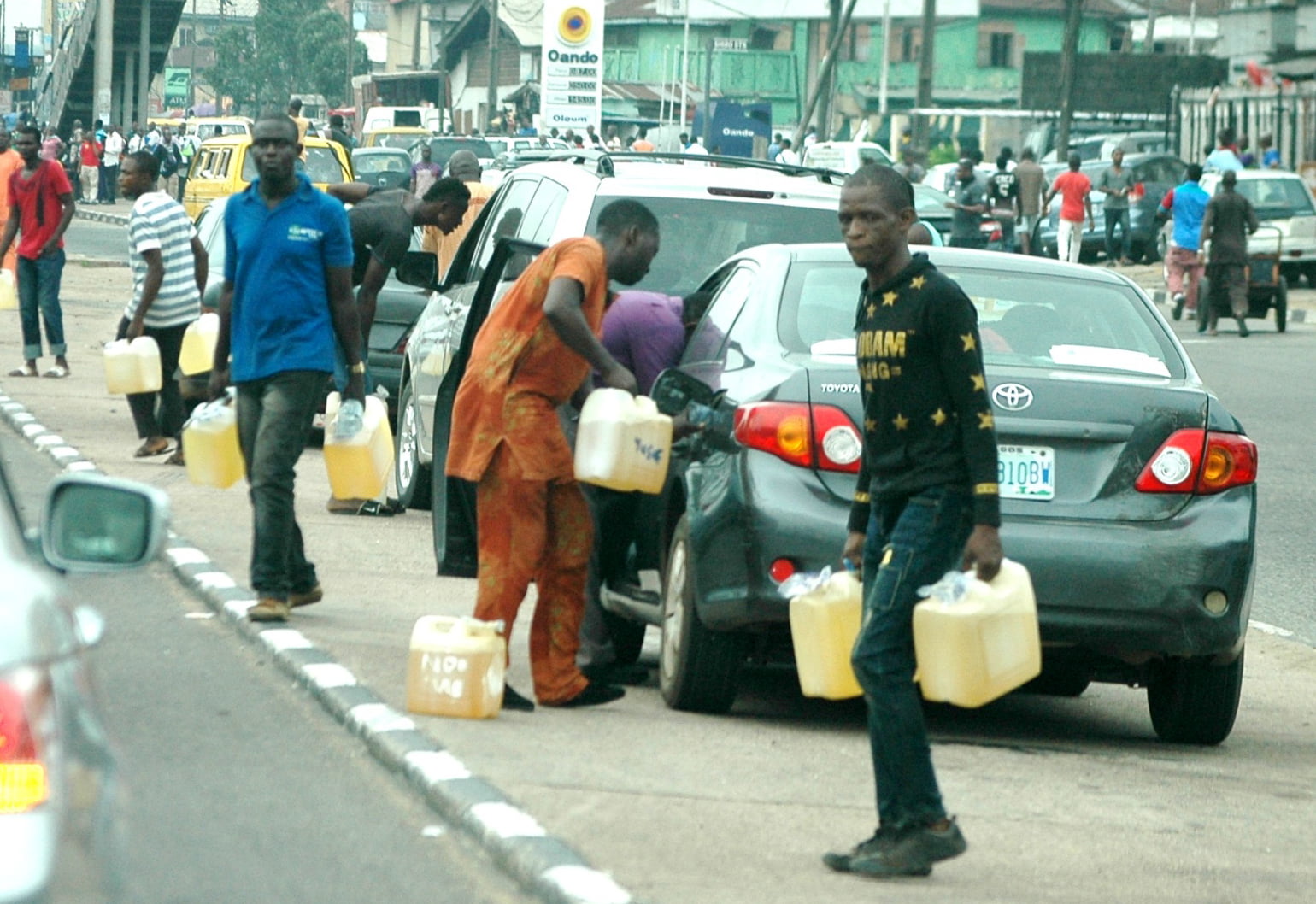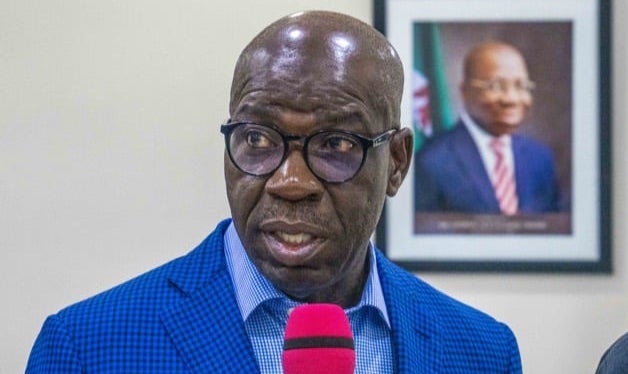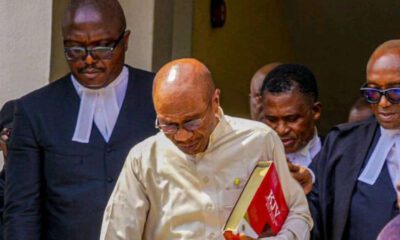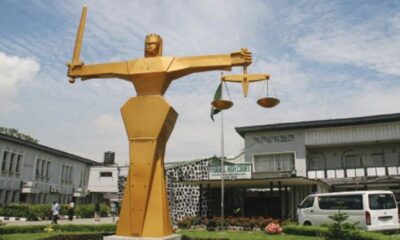Top Story
Again, Court denies Nnamdi Kanu of bail, as IPOB leader alleges death plot in DSS custody

The Federal High Court in Abuja on Tuesday denied the appeal for bail made by Nnamdi Kanu, the incarcerated leader of the Indigenous People of Biafra (IPOB), who is facing trial for treasonable felony charges brought against him by the Federal Government.
Kanu had also urged the Federal High Court to send him to Kuje prison, because, according to him the Department of State Services, DSS, has no medical facility to treat him, adding that there was a conspiracy for him to die in the DSS custody.
He said, “People will come to see me, they will not allow them. They don’t have a medical facility. I have congestive heart failure. They are patching me up. My foot is swollen. I asked them to conduct surgery, and they said they couldn’t. There is a conspiracy for me to die in detention. I want to be transferred to Kuje.”
Rejecting Kanu’s plea for bail, the trial Justice, Binta Nyako, however, directed an expedited hearing of the seven-count charge against Kanu.
Pleading for release on humanitarian grounds due to his deteriorating health, Kanu’s legal team, led by Mr. Alloy Ejimakor, submitted an application on February 5.
However, the court opted to proceed with the case rather than granting bail, signaling a pivotal phase in the legal proceedings against Kanu.
Ejimakor said that there was no doubt that the IPOB leader has a major health problem, as proven by a federal government-owned hospital.
Specifically, he claimed that a series of tests conducted on Kanu showed that he was suffering from hypertension and acute heart illness.
“Our humble submission is that the medical condition of the defendant speaks for itself and the health challenge persists, despite the treatment offered him by the detaining authority,” Ejimako added.
He maintained that Kanu’s continued detention by the Department of State Services, DSS, posed a threat to his life, adding that granting the defendant bail would enable him to effectively prepare his defence to the charges.
Besides, Ejimakor alleged that the seeming delay in the prosecution of the case was the fault of the government which he said had repeatedly amended the charges.
On the court’s observation that Kanu once jumped bail, Ejimakor argued that the development had become academic in view of findings and judgements of various courts on the issue.
On its part, FG’s lawyer, Chief Adegboyega Awomolo, SAN, opposed the bail application, insisting that there was no guarantee that Kanu would make himself available for trial, once released from detention.
Awomolo, SAN, told the court that the security agency had been diligent in protecting Kanu’s life.
He urged the court to reject the bail request and order accelerated hearing of the case.
According to the prosecution counsel, Section 161 of the 1999 Constitution, as amended, stipulated that the defendant must prove that the authorities failed to grant him access to quality healthcare at his detention center.
The senior lawyer further contended that there was nothing tangible that was brought before the court to establish an exceptional circumstance that would warrant Kanu’s release on bail.
He said the court had earlier revoked the defendant’s bail after he violated the conditions attached to it.
“There is no evidence before the court that Kanu will not jump bail again,” Awomolo insisted.
The IPOB leader who was first arrested by security agents in Lagos on October 14, 2015, has been in detention since June 29, 2021.
Justice Nyako had on April 25, 2017, granted him bail on health grounds, after he had spent about 18 months in detention.
Upon the perfection of the bail conditions, he was on April 28, 2017, released from the Kuje prison.
However, midway into the trial, the IPOB leader escaped from the country after soldiers invaded his country home at Afara Ukwu Ibeku in Umuahia, Abia State, an operation that led to the death of some of his followers.
Kanu was later re-arrested in Kenya on June 19, 2021 and extraordinarily sent back to the country by security agents on June 27, 2021.
Following the development, the trial court, on June 29, 2021, remanded him in custody of the Department of State Services, DSS, where he remained till date.
On April 8, 2022, the court struck out eight out of the 15-count charges that FG preferred against him on the premise that they lacked substance.
Likewise, the Abuja Division of the Court of Appeal, on October 13, 2022, ordered Kanu’s immediate release from detention even as it quashed the charge against him.
The appellate court said it was satisfied that FG flagrantly violated all known laws, when it forcefully returned Kanu from Kenya to the country for the continuation of his trial.
It held that such arbitrary use of power by the Nigerian government, divested the trial court of the jurisdiction to further try the Appellant.
Dissatisfied with the decision, FG took the matter before the Supreme Court, even as it persuaded the appellate court to suspend the execution of the judgement, pending the determination of its appeal.
While deciding the appeal, the Supreme Court, on December 15, 2023, vacated the judgement of the appellate court and gave FG the nod to try the IPOB leader on the subsisting seven-count charge.
Justice Nyako had earlier expressed her displeasure over how the trial had been conducted since 2015.
“This is exactly the way this case has been going since 2015. I am talking to both sides. You always find a way to truncate the proceedings,” the judge fumed.
Top Story
Black market resurfaces, as Lagos, Ogun commuters beg for relief as PMS supply worsens


…Product sells above N900/ltr
By Sodiq Adelakun
Lagos commuters faced a difficult Monday as the lingering petrol scarcity continued to bite, leaving many stranded at bus stops across the city.
The crisis deepened as motorists scrambled to fill-up at dispensing stations, leading to a hike in fares.
With many filling stations shut and others selling the scarce commodity at exorbitant prices, tricycles and buses – the lifeline for daily commutes – were scarce, struggling to access fuel.
Some motorists revealed to NewsDirect that they purchased petrol at N900 and N1,000 per litre at filling stations, while roadside dealers sold the product for as high as N1,200 and N1,300 per litre.
The situation worsened as many filling stations stopped selling fuel altogether, exacerbating the woes of commuters who were forced to pay inflated fares or trek long distances to their destinations.
In most of the bus stops visited by NewsDirect on Monday, survival of the fittest was the prevailing philosophy as hordes of commuters were seen running after a few commercial buses.
However, chaos erupted at bus stops across Lagos on Monday as observed by our correspondent when desperate commuters scrambled to secure a spot on the few available commercial buses.
The transportation system has been thrown into disarray, leaving many wondering when the situation will improve.
Recall the crisis began after President Bola Tinubu announced the end of the petrol subsidy regime on May 29, 2023, aiming to allow market forces to determine pump prices, boost government revenue, and reduce disruptions in the value chain.
However, the move has triggered severe petrol scarcity, leading to a hike in fares across Lagos.
Commuters are feeling the pinch, with fares skyrocketing by as much as 50 percent.
For example, the journey from Kola roundabout to Agege, which previously cost N400 or N300, now costs N800. Similarly, the trip from Agege to Alausa in Ikeja has increased from N300 to N400.
According to one of the commuters, Temitope, he said, “Oh my goodness, I can totally relate to this! I was at the bus stop yesterday and it was like a war zone! People were pushing and shoving, trying to get on the few buses available.
“I was lucky to get on one, but I had to pay N800 for a journey that normally costs N400! It’s like they’re taking advantage of our desperation. And to think it’s all because of the petrol scarcity caused by the removal of the subsidy.
“I understand the government’s intention, but they should have had a better plan in place to mitigate the effects on commuters like us. This is really tough, and I hope they find a solution soon!”
Also, a female marketer, Promise, has lamented the devastating impact of the ongoing petrol scarcity on her business, echoing the plight of many others in the sector.
She said, “This petrol scarcity is affecting my business so much! I sell perishable goods at the market, and I need to transport them daily from one place to another.
“But with this scarcity, the few buses available are hiking their fares and it’s eating into my profit. I used to pay N400 or N300 from Kola roundabout to Agege, but now they’re asking for N800! And from Agege to Alausa, it’s now N400 instead of N300.
“How am I supposed to make a living like this? The government should do something to help us, we’re suffering! I’m a widow with three children to feed, and this is really affecting my family. Please, something needs to be done urgently!”
Top Story
Obaseki approves new minimum wage of N70,000 for Edo workers


…Urges FG to follow suit
By Elvis Omoregie, Benin
The Edo State governor, Mr. Godwin Obaseki has announced a 90 percent increase in workers salary, instead of N40,000 the least worker in the state will now go home with N70,000 as a result of the increment effective May 1.
He disclosed this on Monday during the Commissioning of the newly built Labour House, an edifice that would house the Nigeria Labour Congress (NLC) and Trade Union Congress (TUC) secretariat in Edo State
The Governor said workers have continued to be challenged due to devaluation and inflation which, according to him, has made the workers wages insignificant.
Obaseki also urged the Federal government to increase workers salaries more than what his administration was offering and vowed to also adjust the State workforce wage.
According to him, “I am one of those governors advocating that we must adjust the minimum wage of workers in Nigeria.”
Obaseki also put aside partisan politics and named the edifice after his predecessor, Senator Adams Oshiomhole.
The Governor was joined in the exercise by Comrade Joe Ajero and Festus Uwaifo, National presidents of Nigeria Labour Congress (NLC) and Trade Union Congress (TUC) respectively.
Top Story
Naira appreciates by 5.93% on parallel market


The Naira on Monday gained 5.93 percent on the parallel market, popularly called the black market.
The local currency exchanged with the US dollar at the rate of N1,350 on Monday, as against N1,430 exchanged on Friday on the black market.
According to currency traders, the naira appreciation followed a moderation in the demand for the greenback, which was scarce on Friday due to scarcity of dollars.
At the Nigerian Autonomous Foreign Exchange Market (NAFEM), the naira depreciated by 2.24 percent as the dollar was quoted at N1,339.23 on Friday compared to N1,309.88/$1 quoted on Thursday last week, according the data released by the FMDQ Securities Exchange.
The intraday high closed at N1,410 per dollar on Friday, stronger than N1,435 closed on Thursday. The intraday low also appreciated to N1,051 per dollar on Friday, from the low of N1,100/$1 quoted on the spot trading on Thursday.
Dollar supplied by the willing buyers and willing sellers declined marginally by 2.85 percent to $309.01 million on Friday from $318.08 million recorded on Thursday.
-
capital market2 years ago
Rt.briscoe, FBNH, Others halts negative performance of stock market
-
Finance3 months ago
Court orders Sen. Victor Umeh to repay N136m bank debt to AMCON
-



 Abuja Update2 months ago
Abuja Update2 months agoUNDP, FG partnership needed to achieve inclusion, equity- Minister
-
Abuja Update1 month ago
Banks drive stock market performance with N147bn gain
-



 Business1 week ago
Business1 week agoTingo Group unveils Tingo Electric, Tingo Cola drink at Lagos launch
-



 Health2 weeks ago
Health2 weeks agoCapacity training will reduce migration of health workers- NPHCDA
-



 Infotech4 weeks ago
Infotech4 weeks agoWorld Backup Day: NITDA urges Nigerians to ensure backup of data
-
News4 months ago
Oil thieves sponsoring malicious media campaign against Navy – Spokesman












